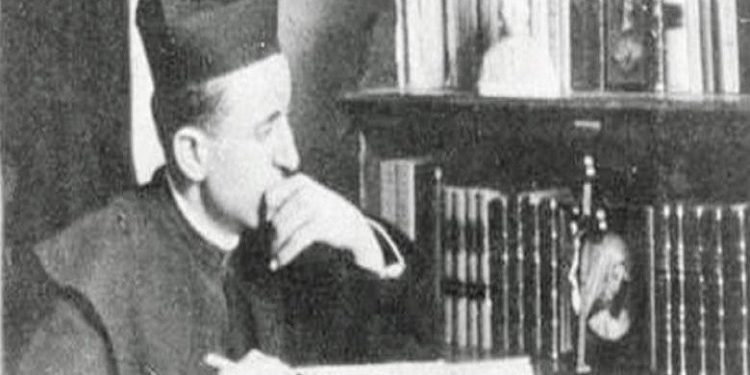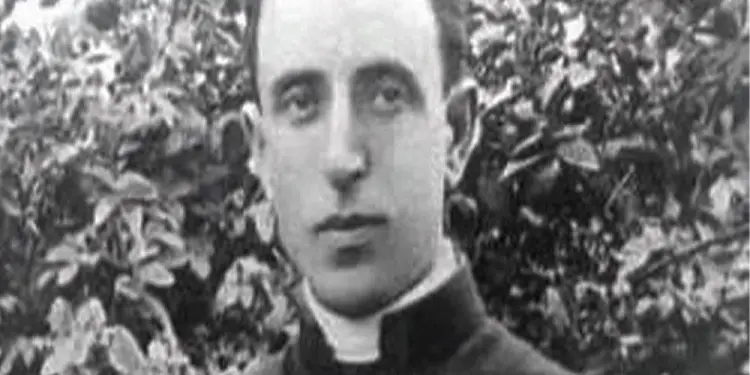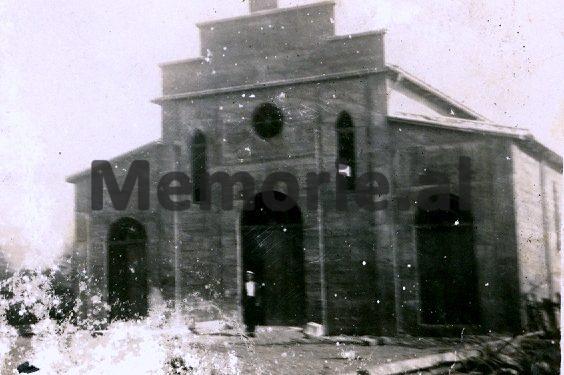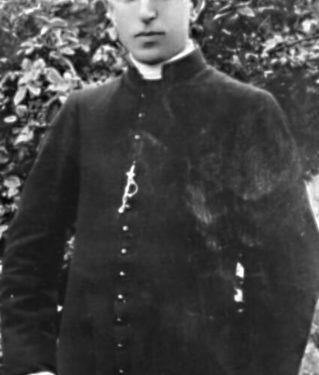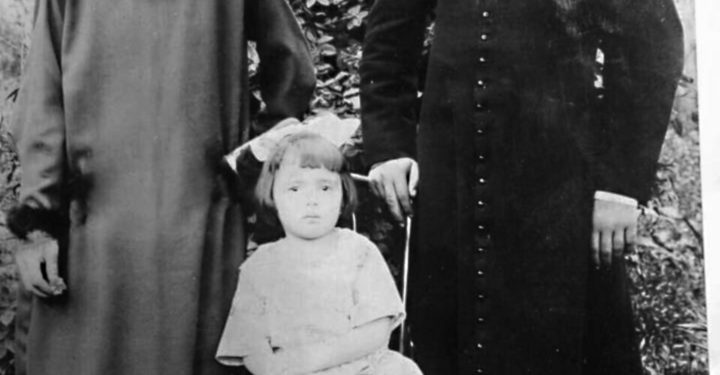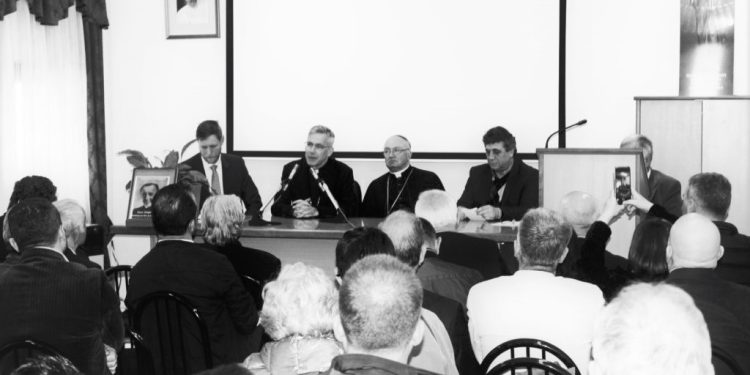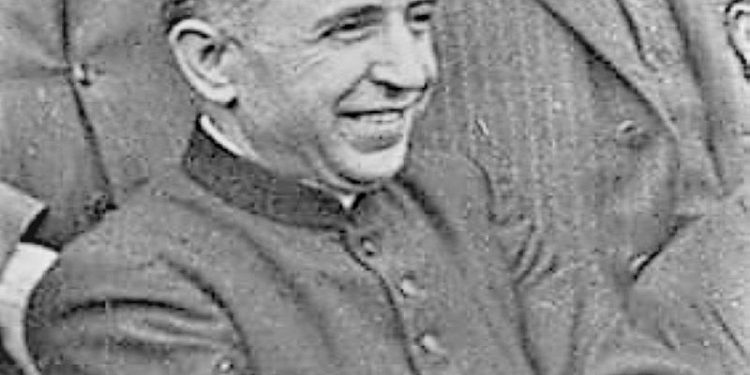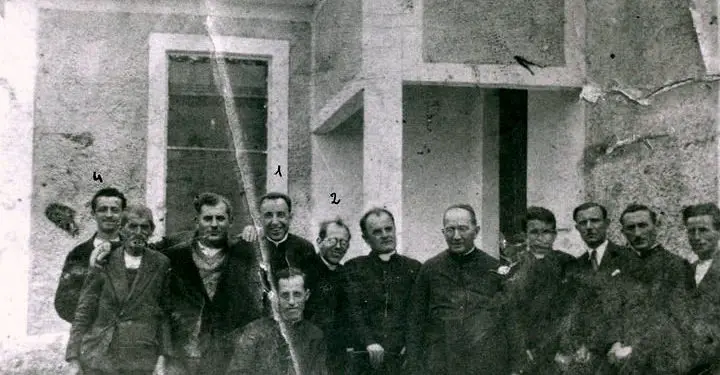NIKOLLË LOKA
Av. ALFDRED DUKA
NIKOLIN KURTI
Part thirteen
WHY DOES THE POLITICAL ACCUSATION OF COLLABORATION NOT STAND?
-Continuing the tradition of native Catholic clergy –
Cooperation for the state and only in its interest
While serving the sentence
Memorie.al/For years, his family did not have any news until one of the sisters, who remained in Kosovo, managed to find out that he was still alive through a Bishop, who had read it in a newspaper. In fact, a little later, the sister in Skopje received a letter from Don Shtjefëni, posted by Burrel, asking for vitamins and medicine. Even in the Burrel prison, the State Security bodies targeted Shtjefa Kurti. They often isolated him in the icy dungeons of the prison, where he spent whole nights, because even in prison he performed good deeds, saying mass.
Regarding the first imprisonment Dr. Lazar Radi remembers: “… Once, on Christmas night, with the light darkened as usual, Dom Shtjefni said mass at midnight. After mass, when the lights are turned on, we see the floor wet from his tears…”. Even Mark Shantoja brings interesting information from life in prison, where Dom Shtjefni continued to practice his profession: “In a meeting with a nun, he asks her: Send me that bar called ‘Vinum Missa’ He repeats it once more after she doesn’t it is remembered that this begs the vein, to take mass. Then they bring you an arrangement bottle with a label supposedly as medicine. During the long years in prison, Shtjefën Kurti had the help and interest of the clerics Zef Bici and Mark Dushi, who had sent money to the order, which according to his words amounted to one thousand old ALL.
Hard life after prison
Due to an amnesty, on May 2, 1963, Shtjefën Kurti was released from Burrel prison, after serving 16 years, 6 months and 2 days in prison, benefiting from a four-year sentence reduction. On a cold November day in 1963, Kurti leaves the prison cells to feel temporarily free. He lived a private life, initially with his brother Kel Kurti in Gurëz. According to the colleague with the nickname “Adresa”, he was forced to leave his brother’s family, because Keli spoke against the government and his expressions harmed him, as he knew that he was being monitored by the Security. After leaving his brother, Shtjefni took shelter at the cooperative’s offices, then for a year or more at Tomë Nokë Leka’s house and recently at Shkurt Mark Biba’s house, says the associate “Guri” and after he became a member of the cooperative, he was again given a room by the Cooperative Presidency, in Gurëz.
Dom Shtjefni did not agree with the stuttering, not only as a cleric who was forbidden to exercise his profession or who experienced the prohibition of religious belief by law, but also because of the wrong economic policy of the state. In conversations with his acquaintances, he expressed his attitude: “… this political system in Albania, today we are bad, tomorrow we will be even worse. Workers there, in western countries, when they go to work, they have their cabin, where they leave the clothes they came with and wear the work clothes, and when they leave work they shower, wash and dress in the new clothes, as they are not recognized as workers; like here in Albania, especially in agriculture, workers have shortages of food, whether for clothing and they have to go to work all day long”.
Shtjefën Kurti had also criticized the lack of democratic freedoms and the violation of human rights, making comparisons between the two political systems, capitalism and socialism, even within socialist countries, where he had evidenced that in Albania the state of human rights was more problematic than in any other country in the world. “In Western countries, one enjoys all the democratic freedoms and to listen to foreign radio stations, because there, the political order differs from this one in Albania.
We have a totalitarian state here, without other parties. Here in Albania, a person is not free to develop his political thoughts, because if it were so, there would be different parties, everyone according to their own views; the freedom of their bodies, the freedom of meetings, the freedom of demonstrations, rallies, the freedom to give speeches on the radio, the freedom to organize the election campaign, to vote where they want, to have their representatives in the Parliament, the freedom to maintain the rights of their party’s program and when they don’t like the actions of the government, to criticize them according to the party’s program”.
Prohibition of practicing the profession
To start working as a cleric, Kurt needed a state permit, but in October 1964, he had received a negative answer regarding the right to practice the profession. The Archdiocesan Council in the meeting dated 26.VII.1966, held in Delbnisht, had appointed him Parish Priest in Juba of Durrës. This is confirmed by minute’s No. 32/66, dated 26.VII.1966. The central bodies had given him permission, paving the way for Archpriest to appoint him. In October 1966, Arqipeshkvi had appointed him parish priest in Juba.
Prot. No. 32/66
Record
On 26.VII.1966, Tuesday in the Delbnish Parish Office, the Archdiocesan Council of Durrës met under the chairmanship of Ordinator Mr. Follow Sahatçia, to find them next to Mr. Ndoc Ndoja, D. Mark Dushi, D. Anton Doçi and D. Frano Ilija, the latter secretary of Kruje.
- The Ordinariate announced that in the list of parishioners of the Archdiocese, two priests from the Archdiocese were also effective as divinity, after their approval was obtained: D. Shtjefën Kurti, D. Pashko Muzhani, as well as D. Marjan Ashta approved before me and temporarily appointed parish priest of Selita e Madhe, as well as Administrator of Perlat e Lure parishes.
- The Ordinary wants the need for transfers to be included in this district with the system of the two priests mentioned above. The Ordinator proposed:
- a) The departure of Don Anton Doçi from Gurëzi, who is invited to express his will for the parish where he wants to go, as well as Mark Dushi, the Ordinator proposed that these two parishioners exchange their parishes: D. Anton Doçi from Gurëzi in Delbnishti and D. Mark Dushi from Delbnishti, in Gurëz.
- b) Dom Shtjefën Kurti, parish priest in Jube.
- c) Dom Pashko Muzhani in Zhej – Mamurras.
ç) Dom Pal Gjini, be advised to leave the Parish Durrës to Milot or Bilaj, ask the Parishioners of Dom. Ndoc Ndoja (Bilaj) and Dom Frano Ilia (Milot) will give their own parish, in the event that D. Pal Gjini chooses one of these two parishes, an offer that is made to him as a veteran of the Archdiocese. This advice is left to the Ordinary. This step is considered necessary for the reason of knowing.
- d) At this time, Dom Shtjefën Kurti will make repairs in the parish apartment of Juba and stay in the parish apartment of Durrës, together with the parish priest or in a separate room.
Regarding his departure to Juba, Dom Shtjefni informs the Archbishop’s Office.
Parish Office
Jube
No. 2/66
Office Ord. Arq. of Durrës
Tirana
We sign, have the honor to inform that Office Ord. Arch. of Durrës, that on 16.IX.1966 I definitely took a place in the parish that that Office entrusted to me.
I got a room in the village, without a ceiling, without a floor and without plastering.
The servant of that Z.O. Arch. The parish priest
Dom Shtjefën Kurti
For his part, the Ordinary, Dom Ndoc Sahatçija, informs the Executive Committee of the People’s Council of the Durrës District, regarding his appointment, without asking for an opinion, much less permission.
Executive Committee K.P. of the Circle
Durrës Presidency
We have the honor to inform you that by Decree-name No. 36/66 dated 27.VII.1966, we named Dom Shtjefën Kurti parish priest of the Catholic Church of Juba, which was administered by Dom Pal Gjini, parish priest of the city of Durrës, as deputy parish priest.
P/Archiepiscopal Curia, Durres
Ordinaries
Dom Ndoc Sahatçija
The Executive Committee of Durrës opposes the appointment and considers it illegal:
Durrës, on 2.XI.1966
People’s Republic of Albania
Committee Ex. KP of the district
No. 430/205 Prot.
Albanian Catholic Episcopate
PRESIDENCY
Shkoder
Articles No. 16/17 dated 11.X.1966
As we have also informed the vicar Dom Shtjefën Kurti, we inform you that the appointment of the aforementioned person was made contrary to the provisions in force. I saw from your side that the consent of the Executive Committee was requested for his appointment.
Since the appointment of Dom Shtjefën Kurti was made contrary to the rules, without respecting this procedure, we do not approve his position and appointment in the district of Durrës. That is why it should leave immediately.
This Archbishop must consult with us before making the appointment.
To the KP Executive Committee of the District.
The President
Iljaz Reka
After the opposition of the Executive Committee, the Durrës Archbishop’s Curia turned to the highest body of the Catholic Church, the Presidency of this Church, with the request to intervene with the competent bodies and make possible the return of Dom Shtjefni to Juba:
Tirana, 10.XII.1966
Durrës Archbishop’s Curia
Tirana No. 67/66. Prot.
Presidency of the Albanian Catholic Church
PRESIDENCY
Shkoder
We received your notification No. 61/66 dt. 1.XII.1966, in which he sent us letter No. 43/205, dt. 2.VI.1966 of the Presidency of
Committee Ex. K.P. of Durrës
Thank you for your interest.
For Juba Parish, unfortunately we do not have any other person to name. You yourself know that we need to send a parish priest to Juba and we believe that with the name of Dom Shtjefën Kurti, we have solved this need. We have no choice, but please take the steps near the Presidency of the Com. Ex. K.P. of Durrës, to have the kindness to allow the return of Dom Shtjefën Kurti as parish priest in Juba.
P/Archiepiscopal Curia of Durrës
Ordinaries
Dom Ndoc Sahatçija
Dom Shtjefën Kurti had received a negative response from the President of the Government for the prayer that he sent directly for the interest in granting the right to exercise the service as a priest in a church.
Article 12, point of the Statute of the Albanian Catholic Church, “Residential bishops or, in their absence, Vicar-Capitulars, have the right to appoint and transfer parishioners within the diocese, after receiving the consent of the diocesan councilors.” In the Statute, it is not mentioned anywhere that the Bishop or Vicar-Capital must obtain approval to appoint clerics to office. The state deprived Kurt, in violation of the laws, from practicing his profession. It is sometimes written that Dom Shtjefni began as a parish priest in Gurëz. In fact, he was no longer engaged as a priest, but stayed there next to the parish priest Don Mark Dushi and practiced the clerical profession privately. These data also come from a letter he sent to his granddaughter in Kosovo, Lina Çipriani: “I received an ode here in the village; I live in Worfnia and say mass daily in private. Sometimes they give me alms.
Systematic surveillance until the second arrest
Security agencies were led by the figures of crime, defined in the Penal Code, such as agitation and propaganda, illegal crossing of the border, treason against the motherland, espionage, diversion, formation of organizations and other parties, etc. In all these cases, the Operative Worker opened the operative agential file, mainly of the types (most important): – Active processing 2/A – Operative control 2/B – Centralized agential problem (on one person). In secret, one or several people were followed for months or years, according to importance.
The follow-up was carried out by an Operative Worker, who was controlled by the deputy head or the head of the Internal Affairs Branch of the relevant district, as well as by the relevant branch in the Directorate of State Security in the Ministry of Internal Affairs. The follow-up provided for the reports of the associates on what the follower expressed, there was the disclosure of his intercepted conversations, as well as the plans of the measures taken by the operative worker with the approval of his superiors.
Immediately after his release from prison, Dom Kurti came under the surveillance of the Security, which followed him every step of the way, in Gurëz, Tirana, Durrës, Shkodër, etc…, as they had defined him as “a dangerous person who could be activated in every situation”.
The state wanted to know his movements and in order to monitor him; they charge some collaborators, whose number increases after the collection of the first information. They demand that he speak about foreign policy, as an insurmountable trap, where he could immediately end up with accusations of “hostile activity”, “sympathy for imperialism or revisionism”, “criticism of our country’s foreign policy, etc”. They asked him what he thought about the Yugoslavs, the Chinese, the Soviets, etc.
Information of State Security associates
Shtjefan Kurti – Gurez
Taken by Lieutenant Nazmi Domi
Given by resident “Partizani”
Durrës on 29.X.1968
REPORT
The source announces that in September 1963, he came to Durrës to Tadea Kurti, a resident of district no. 2, Dom Shtjefën Kurti, who has recently been released from prison from what the source learned from Tadea, who has his Shtjefni, the latter’s right to exercise his profession as a priest has been cut off for 6 months in a row and, for this reason, he is asking to find a typewriter, supposedly to work.
According to the source, this is a politician and there is a good chance that he will use the typewriter for some hostile activity.
The source has learned that Shtjefën Kurti lives in the village of Gurëz in Milot, with his brother, Mikel Kurti. Shtjefni was previously a parish priest for a period of time in Milot. He makes numerous movements such as in Durrës, Shkodër and gets in touch with various priests and nuns
“Partisan”
Task:
In this regard, the resident was not given any tasks, since there is not and cannot be any approach to Stjefni, but he should only inform us whenever he learns from Tadea or someone else, about the arrival of Stjefni in our city and stops for visits.
Evaluation of information:
The information should be evaluated, since Shtjefën Kurti was imprisoned for political activity; is a dangerous person who can be activated in any situation. There is a possibility that he uses the typewriter for living needs, but at the same time, the other possibility that he can use it for hostile activities against the government should not be excluded.
Operational measures
1) The report should be given to the Branch management to see.
2) To be printed in one copy and sent to the Department of Internal Affairs Krujë, in whose jurisdiction the defendant resides in the reports. Memorie.al
Operative Workshop
Lieutenant Nazmi Domi




